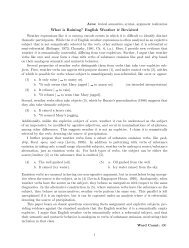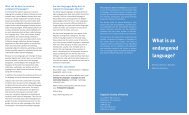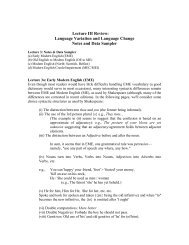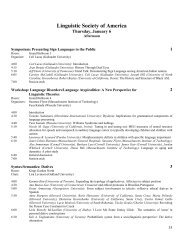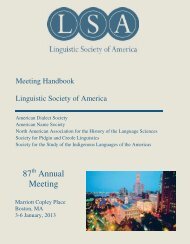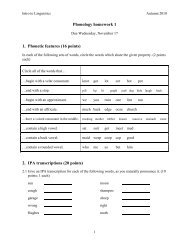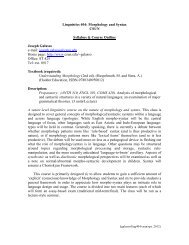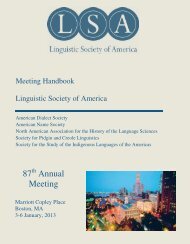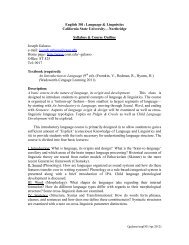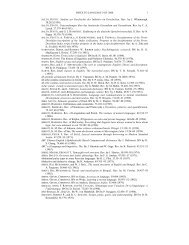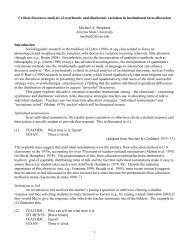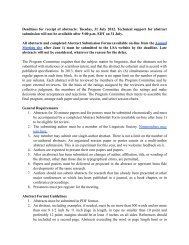View the meeting handbook - Linguistic Society of America
View the meeting handbook - Linguistic Society of America
View the meeting handbook - Linguistic Society of America
You also want an ePaper? Increase the reach of your titles
YUMPU automatically turns print PDFs into web optimized ePapers that Google loves.
against an analysis <strong>of</strong> <strong>the</strong>se constructions in terms <strong>of</strong> overt or covert movement: The ‘raised’ nominal is in a <strong>the</strong>matic position in <strong>the</strong>matrix clause, and <strong>the</strong> putative raising operations would violate <strong>the</strong> complex noun phrase constraint. The ‘raising’ constructionappears to involve two distinct argument positions. Long-distance agreement remains challenging, however, if a movement analysis isexcluded.Susannah V. Levi (Indiana University) Session 27Stephen J. Winters (University <strong>of</strong> Illinois, Urbana/Champaign)David B. Pisoni (Indiana University)Voice-familiarity advantage: Language-specific or language-independent?The speech signal carries both <strong>the</strong> linguistic content <strong>of</strong> an utterance and information about <strong>the</strong> speaker (‘indexical properties’). In alinguistic task, a listener must map a particular speaker's articulation <strong>of</strong> a word to <strong>the</strong> stored, abstract linguistic representation.Previous research has shown that listeners are better able to recover <strong>the</strong> linguistic content <strong>of</strong> an utterance when <strong>the</strong>y are familiar with<strong>the</strong> speaker's voice (e.g. Nygaard, Sommers, & Pisoni 1994), yielding a ‘voice-familiarity advantage’. We examine whe<strong>the</strong>r <strong>the</strong>voice-familiarity advantage is language-independent by examining voice-familiarity <strong>of</strong> bilingual talkers.Lisa Levinson (New York University) Session 16The roots <strong>of</strong> verbsI present novel empirical evidence in support <strong>of</strong> <strong>the</strong> presence <strong>of</strong> category-neutral lexical roots in <strong>the</strong> syntax. I argue that such rootsmust be active in <strong>the</strong> syntax because <strong>the</strong>y can be modified by 'pseudo-resultative' predicates, such as tight in She braided her hairtight. This modification provides insight into <strong>the</strong> semantic type <strong>of</strong> category-neutral roots, which are argued to vary, such that <strong>the</strong> verbbraid is derived from predicates <strong>of</strong> different types in implicit vs explicit creation contexts (braid her hair vs braid a braid). I fur<strong>the</strong>rshow this variation to correlate with differences in argument structure.Erez Levon (New York University) WITHDRAWN Session 49Prosodic & voice quality variation among Israeli gay menI examine how gay men in Israel use variation to linguistically perform <strong>the</strong>ir socio-sexual identities and position <strong>the</strong>mselves withinsociety. Results are based on a sociolinguistic analysis <strong>of</strong> <strong>the</strong> speech <strong>of</strong> 18 men, who were observed and recorded over 12 months.Analyses focus on variation between subjects in order to determine whe<strong>the</strong>r certain features <strong>of</strong> prosody and voice quality aresignificantly correlated with external factors such as ethnicity and political affiliation. Results show systematic differences inobserved prosodic and voice quality characteristics that pattern with <strong>the</strong>se men's different positions in and attitudes towards Israelisociety.William Lewis (University <strong>of</strong> Washington) Session 34Fei Xia (University <strong>of</strong> Washington)Daniel Jinguji (University <strong>of</strong> Washington)Projecting structure onto cata for resource-poor & endangered languagesThe availability <strong>of</strong> language-specific computational tools such as parsers can greatly benefit linguistic research, but it is highlydependent on <strong>the</strong> availability <strong>of</strong> significant quantities <strong>of</strong> hand-annotated data. We describe a method for leveraging a resource createdfor ano<strong>the</strong>r purpose to <strong>the</strong> task <strong>of</strong> creating computational resources for potentially hundreds <strong>of</strong> <strong>the</strong> world's languages, specifically bymanipulating a database <strong>of</strong> interlinearized language examples discovered in scholarly papers, enriching <strong>the</strong>m by projecting syntacticstructures from parsed and aligned English translations. Our methods have thus far been applied successfully to a small set <strong>of</strong>languages: Chamorro, German, Hausa, Irish, Korean, Malagasy, Welsh, and Yaqui.Chao Li (Yale University) Session 48Event complexity & argument realizationBased on <strong>the</strong> transitive and intransitive uses <strong>of</strong> verbs <strong>of</strong> change <strong>of</strong> state like break and Mandarin resultative verb compounds like xiganjing'wash-clean', I argue that <strong>the</strong> ‘argument-per-subevent condition’ proposed by Levin and Rappaport Hovav 1999, 2004, andRappaport Hovav and Levin 2001 to account for <strong>the</strong> argument realization <strong>of</strong> complex events is empirically incorrect. It proposes thatwhat is important for argument realization is <strong>the</strong> ‘structure participant condition’ (cf. Levin 1999), which requires each structureparticipant to be overtly expressed. I show that it is not always <strong>the</strong> case that argument realization patterns reflect event complexity.143



